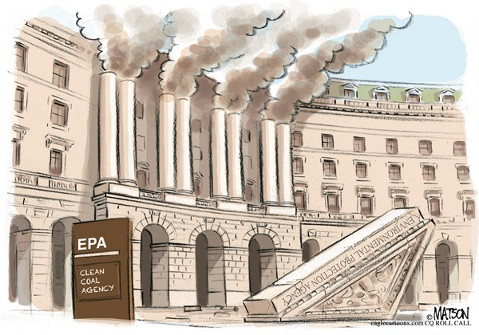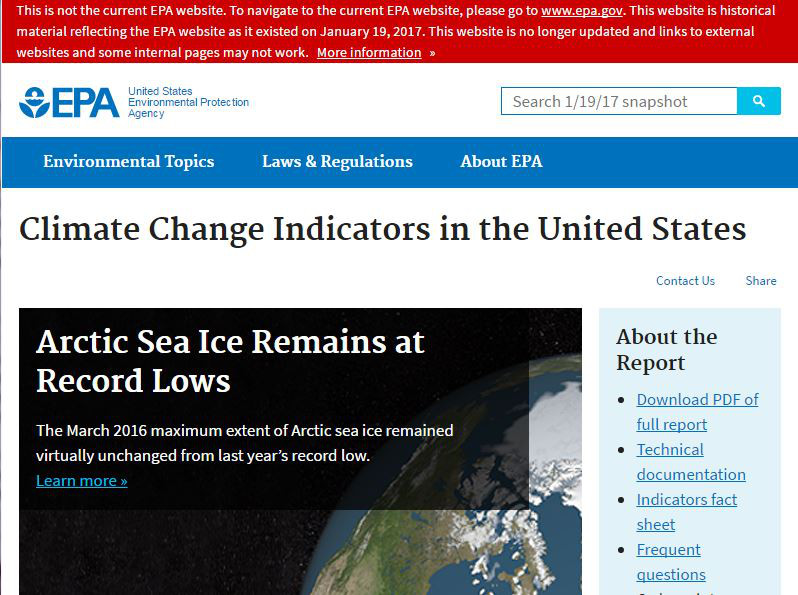Trump’s Censorship of Science
Climate Change Webpage Disappears from EPA, Being 'Updated'

Last month, the EPA quietly removed all climate change-related information from its website under orders of new director Scott Pruitt. Though a “snapshot” links to the old webpage at an archive outside the Environmental Protection Agency, a statement also indicates the agency is “updating language” at EPA.gov. The decision to remove climate change information is not only scientifically unethical, it’s also censorship, a form of political coercion through the control of publicly available knowledge. Trump may think these actions are a show of power, but censorship instances like this one will discredit his administration’s competence, if it hasn’t already, in all fields of governance.
Obstruction of science isn’t new. Under President George W. Bush, federal agencies were advised against using the terms “global warming” or “climate change” in governmental reports. Even more restrictive practices happened in Canada until Justin Trudeau took office; under the previous prime minister Stephen Harper, governmental policies obfuscated communication between federal scientists and the media. With President Trump, it wouldn’t be far-fetched to expect his fling with censorship to extend beyond climate change.
In an economic order now dominated by aggressive industries, the government must maintain an impartial stance between business interests and science. Our government should be protecting us when businesses attempt to profit at the expense of public health. Tobacco is one example of a big industry’s interests clashing with the public’s. Climate change is no different, only this time we are faced with a government that openly sides with another big industry — oil.
Trump’s loyalty lies with his family’s and allies’ businesses, so any science that compromises the bottom line of those industries is at risk. It may involve direct censorship, like the removal of climate change information from EPA’s website. Or it may involve stealthier methods, such as the defunding of programs like PBS and NPR. This suppression of science will not only delay our nation’s response to the urgent threats of climate change, but it will also enable Trump’s administration to stack the deck against any science that does not serve its interests.
Censoring science can cause a balloon effect: Oppression of one part of the “balloon” forces pressure to spill over into another area of less resistance. This phenomenon is exemplified by the US’ “war on drugs” in South America during the late 1980s; the crackdown on drugs in one South American country merely intensified production in another, rendering the drug war a futile effort. Similarly, Trump underestimating the value of scientific information could result in unforeseen and undesirable outcomes. Major businesses in the U.S., from auto industries to real estate companies, depend on information from the EPA. Even other countries rely on our government’s scientific data to predict and plan for natural disasters and agricultural risks. Trump’s suppression of scientific data could compromise the operations of both domestic and international entities.

As for international relations, the U.S. government — as the self-proclaimed leader of the free world — has a moral responsibility to keep its science publicly available. Despite Trump’s denial of climate change, the closest allies of the U.S. (e.g., Canada, Europe) have been tackling the issue for over a decade; their scientists rely on data provided by the EPA, NASA, and other U.S. scientific research bodies. Removal of EPA’s climate change data not only undermines the credibility of Trump’s administration in the public eye, it also obstructs scientific activities and weakens the U.S. as the pioneer of global scientific advancement.
The federal government also has an obligation to objectively disclose scientific research to its tax-paying citizens. The science gives us transparency into how the government makes (or should make) informed policies. If the public can’t see the science for themselves, they won’t be able to trust the government’s decision-making. With a plummeting approval rating of 39 percent in addition to the growing suspicion of Trump’s collusion with Russia, this concealment of science only further weakens his credibility.
As long as Trump’s scandals continue, our distrust in his administration will only intensify. His favoritism for certain businesses and cherry-picking of scientific information will not go unnoticed. And while the administration is busy denying climate change to benefit Trump’s friends in the fossil fuel industry, these actions will bring irreparable damage to the hard-earned reputation of many institutions, such as the EPA, and damage the function of the U.S. government in the long run.
Rowena Eng, Shelby Oliver, and Gokce Sencan are master’s degree candidates at UC Santa Barbara’s Bren School of Environmental Science & Management. Eng’s specialization at Bren is Corporate Environmental Management, Oliver’s is Coastal and Marine Resource Management, and Sencan’s Economics and Politics of the Environment. All three also pursue a focus in Strategic Environmental Communications and Media.



